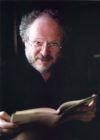

back/retour
emeritus professor of linguistics
Biographical sketch
As a comparatist, HW contributed to the study of the morphology of a number of languages and language families: Pré-Indoeuropean (Hittite, Old Egyptian), Indo-European (Italic, Romance, Germanic, Creole), African (Mande, Kwa, Bantu), Austronesian (Malagasy, Polynesian), Amerindian (Arawakian, Caribian). A list of his work between 1963 and 2002 would amount to more than 140 items (see the bibliograpy on this site, with access to some of his most important writings).
He is a life member since 1962 of the Linguistic Society of America (LSA). In 1965, he cofounded with André Rigault and Douglas Ellis the Linguistics Department at McGill University. In 1981, he was the cofounder, with Normand Beauchemin and Robert Fournier, of the Linguistic Society of Quebec (Association québévoise de linguistique) which he served for 10 years as president, secretary general and organizer of the annual meeting. In 1981 as well, he became the first Editor of the Revue québécoise de linguistique théorique et appliquée, a responsability he assumed for the following 20 years.
Politically, HW is known for his anarcho-syndicalist sympathies with strong links to the CNTU (Confederation of National Trade Unions), communautary and anti-war movements. In 1974-1978, he was at the center of a union conflict at the University of Quebec which changed the landscape of collective bargaining in the academic world. A specialist of the linguistic heritage of Quebec, he also is a stout defender of Quebec independance.
In the 40 years up to 2002, HW has served on a number of commities, commisions and boards in various positions. His students, colleages and friends througout the World would be most grateful if the work of his lifetime, his comparative grammar of French vernaculars outside Europe, would eventually see publication.